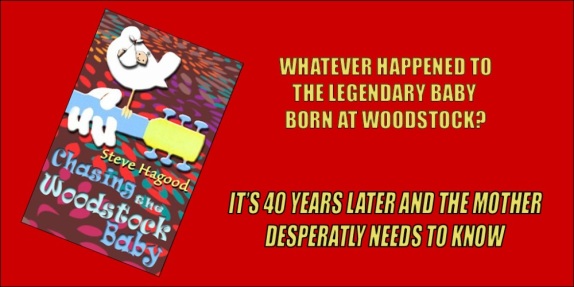
Welcome, Steve. What is your book about?
Retired Detroit police detective Chase is approached by a nice old lady who asks him to find the baby she had, and lost, at Woodstock. The search takes Chase to a small town in Michigan that has a secret that it has been hiding for four decades. The man who runs the town will go to any lengths, including murder, to keep the secret.
What inspired you to write this particular story?
I have always been fascinated with Woodstock. When I heard the legend of the Woodstock baby I wondered what had happened to it. Why has nobody ever come forward to claim to be the baby, or the mother? My imagination took over from there.
Tell us a little about your main characters. Who was your favorite? Why?
Obviously, my protagonist Chase is my main and favorite character. A lot of Private Investigators in novels have a sidekick who acts as his foil – dark, mysterious, the guy who does the dirty work – Spenser and Hawk, Elvis Cole and Joe Pike. Chase is both of those guys rolled into one. He is the wise cracking, lovable guy who isn’t afraid to do the dirty work.
Sarge and Sally are Chase’s partners in the bar he owns. Sarge was Chase’s training officer when he joined the Detroit Police. He still acts as a mentor and a steadying influence. Sally is the brains of the operation. She acts as Chase’s de facto research department. She doubles as the female, creating sexual tension between the two.
Did you do any research for the book? If so, how did you do it? (searching Internet, magazines, other books, etc.)
Yes. I had to do quite a bit of research for this book. The internet is a wonderful tool for a writer. It can transport you to any place and any time you want. I was able to put myself at Woodstock through pictures and stories. Hopefully my writing puts the reader there with me.
What’s your writing schedule like? Do you strive for a certain amount of words each day?
I don’t really have a schedule. I have a day job and a family so it’s not always easy to find time to write. I write when I can. I live by the mantra “Writers write” to push myself to write something every day, even if it’s just a few paragraphs or sentences.
What are you working on right now?
I recently finished another Chase novel, titled Cold Dark Places. Hopefully we will see it soon from Indigo Sea Press. It’s a story about a college girl missing in Detroit, and the basketball player implicated in her disappearance.
What was the first story you remember writing?
I didn’t start writing until about thirty. The first story I wrote was a ghost story. I don’t know why. It’s the only ghost story I’ve ever written. It was about a group of friends on a fishing trip who were haunted by the ghost of a Civil War soldier. It wasn’t very good, but it was a lot of fun to write.
Where do you get the names for your characters?
Names are tough. One of the techniques I use is to open up the internet and use the first name that I see, if it fits the character that I need to name. I head up a scholarship given by my graduating class to the high school we graduated from. I offered my former classmates their name in a book in exchange for a donation to the scholarship. I had a couple people who wanted to see their name in a book, so it worked out for me, for them, and the scholarship.
What’s been the most surprising part of being a writer?
The most surprising aspect of writing, for me, is when the story builds upon itself. Sometimes I feel like a stenographer. I’m just the guy typing the words, the story is writing itself. In The Woodstock Baby there is a scene where Chase is questioning a suspect, the suspect denies any involvement and Chase says, “We have a witness!” I thought, “Wow, there’s a witness!” I didn’t know there was a witness until I typed it, and I’m the author! I couldn’t wait to see who the witness was because I sure didn’t know.
What writer influenced you the most?
I actually have two big influences. The late great Robert B. Parker made me fall in love with books. His Spenser stories are still my favorite. I’ve read them all multiple times. The fact that Chase is known by a single name is in homage to Parker and Spenser.
The other writer who influenced me is JA Konrath. I love his books, but it’s more than just his writing that influenced me. One thing the general public doesn’t know is that it is very difficult to get published – “you should publish that” a lot. If only it was that easy. Konrath called himself the king of rejection. He wrote nine full novels in two or three different genres before he got one published. He accumulated literally hundreds of rejections, but he never gave up. He eventually broke through and now has millions of books sold. He inspired me to never give up, to never stop chasing my dream.
What one word describes how you feel when you write?
Joy
If your book was made into a TV series or Movie, what actors would you like to see playing your characters?
Ironically, in Cold Dark Places I make mention to The Woodstock Baby and how some Hollywood people wanted to make a movie about the case. They promised to get Denzel Washington to play Chase, even though Chase is “white, younger than, and nowhere near as pretty” as Denzel.
In “real life” I see Chase as more of a Will Patton type. He has the ability to be caring and tough and make them both authentic.
There’s this other actor who I know named Tevis Marcum who I think would do an outstanding job as Chase. He’s from the Detroit area and has the look. Like Will Patton he has the ability to be caring and tough in the same character.
What is something you never leave home without (apart from keys, money and phone)?
My flash drive. My work goes everywhere with me. I do back it up to my computer however. It has gone through the wash a time or two. There is no terror like the terror of finding your flash drive in the bottom of the washing machine.
What is your favorite place, real or fictional? Why?
Saline, Michigan. It’s my hometown. I moved away for a while and when I returned I thought, “Ahh, I’m home.” When I needed a small town to set The Woodstock Baby in I chose Saline because “there’s no place like home.”
Where can people learn more about your books?
From Indigo Sea Press http://www.indigoseapress.com/Stiletto-Books–Crime-and-Mystery-Authors-A-H.php#Steve and www.stevehagood.com



 Fear and hate spurs people to react in different ways. The extremes in emotions on both sid
Fear and hate spurs people to react in different ways. The extremes in emotions on both sid



![Pageflex Persona [document: PRS0000035_00015]](https://secondwindpub.wordpress.com/wp-content/uploads/2015/07/front-cover.jpg?w=113&h=176)

 Gaudet is the author of Where the Bodies Are
Gaudet is the author of Where the Bodies Are![Pageflex Persona [document: PRS0000035_00015]](https://secondwindpub.wordpress.com/wp-content/uploads/2015/05/img_3211.jpg?w=253&h=365)

![Pageflex Persona [document: PRS0000035_00015]](https://secondwindpub.wordpress.com/wp-content/uploads/2015/05/back-cover-blurb.jpg?w=396&h=301)













